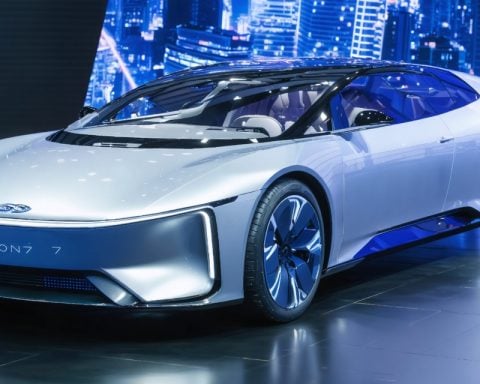In December 2024, Türkiye witnessed a remarkable shift in its automotive landscape, with Chinese car brands making significant strides in market share. Following BYD’s impressive entry, which captured a 3.7% share in its debut month, local consumers have shown a growing preference for vehicles from these manufacturers, particularly Chery.
The Turkish Statistical Institute reported that car registrations soared to 108,753 in December, marking a substantial 28.17% increase compared to November. This trend contributed to an overall market share of 6.7% for Chinese vehicles, largely thanks to BYD’s successful launch on November 15, which resulted in 6,591 sales in just over a month.
In contrast, traditional leader Renault experienced a decline of 2.2 percentage points, amidst a slight uptick in sales for other European brands, which saw their combined market share drop from 71.2% to 55.4%.
By the end of December, the total number of registered vehicles in Türkiye reached 31,301,389, with cars making up 51.9% of that number. During 2024, vehicle registrations increased by 13.5%, amounting to 2.598 million new vehicles. Among the newly registered cars this year, gasoline vehicles represented 60.8%, while electric cars accounted for 10.2% of the total.
As the market evolves, the increasing footprint of Chinese brands signals a new era in Türkiye’s automotive industry.
Shifting Gears: The New Wave of Automotive Influence in Türkiye
The burgeoning presence of Chinese car manufacturers in Türkiye’s automotive sector is not merely a shift in market dynamics but a reflection of larger global trends reshaping the industry. This shift signals a potential recalibration of global automotive power, as local consumers increasingly embrace alternatives to established European brands. The rise of companies like BYD and Chery illustrates a growing demand for affordable, technologically advanced vehicles in developing markets, which may further prompt traditional carmakers to innovate or risk obsolescence.
Culturally, this influx could influence consumer perceptions around quality and value, particularly as younger Turkish buyers seek cost-effective yet feature-rich vehicles. This paradigm shift suggests that Turkish society may start to prioritize utility and sustainability over brand loyalty, catalyzing a broader rethinking of consumer behavior in the automotive space.
From an environmental perspective, the amplified adoption of electric vehicles—alongside the 10.2% registration of electric cars in 2024—could herald a transition towards cleaner transportation options. As more Turkish drivers opt for EVs, this trend could impact urban air quality and contribute to national climate goals.
Looking ahead, as global automotive trends shift towards electrification and sustainability, Türkiye’s evolving market dynamics could position it as a key player in the global economy. Not only will this reshape local employment landscapes and manufacturing priorities, but it may also serve as a pivotal case study for nations grappling with similar industry transformations.
Chinese Car Brands Revolutionize Türkiye’s Automotive Market
In December 2024, Türkiye’s automotive landscape underwent a notable transformation, driven by the impressive rise of Chinese car manufacturers. Particularly, BYD, a well-established Chinese automotive company, made waves with its entry into the Turkish market, achieving a striking 3.7% market share within its first month. This remarkable debut has sparked increased interest among local consumers, particularly in vehicles from brands like Chery.
According to recent data from the Turkish Statistical Institute, vehicle registrations in Türkiye skyrocketed to 108,753 in December, reflecting a robust 28.17% increase compared to the previous month. The surge in registrations has significantly bolstered the market presence of Chinese automotive brands, which collectively captured a total market share of 6.7%—a feat largely attributed to BYD’s successful launch on November 15, which netted 6,591 sales in just over a month.
This shifting dynamic has seen the traditional market leader, Renault, facing challenges, as its market share declined by 2.2 percentage points. Conversely, while other European brands experienced a minimal increase in sales, their combined market share plummeted from 71.2% to 55.4%. This decline highlights the competitive pressure from the emerging Chinese brands.
As of the end of December, the overall number of registered vehicles in Türkiye reached an impressive 31,301,389, with passenger cars constituting 51.9% of that total. Throughout 2024, vehicle registrations demonstrated a healthy 13.5% growth, with 2.598 million new vehicles entering the market. Notably, gasoline vehicles accounted for 60.8% of registrations, while electric cars captured 10.2% of the total, underlining a growing inclination towards greener mobility solutions.
Insights into the Emerging Trends
Market Analysis
The automotive market in Türkiye is witnessing a significant shift towards electric vehicles (EVs) and competition from international brands. This could suggest a diminishing dominance of traditional European manufacturers and a burgeoning acceptance of Chinese vehicles among Turkish consumers.
Pros and Cons of Chinese Vehicles
Pros:
– Competitive pricing: Generally, Chinese brands offer vehicles at more affordable prices compared to European counterparts.
– Diverse offerings: A variety of models to cater to different consumer preferences.
– Innovative features: Many Chinese automakers are incorporating advanced technology in their vehicles, appealing to tech-savvy consumers.
Cons:
– Brand perception: Chinese brands may still face challenges regarding quality perception compared to established brands.
– Service availability: Limited service infrastructure may affect the ownership experience for some consumers.
Future Predictions
As the market continues evolving, the growth of the Chinese automotive segment is anticipated to accelerate, likely fueled by increased investment and consumer interest in electric vehicles. By 2025, the market share of Chinese brands could exceed 10%, especially if they continue to innovate and expand their offerings.
Sustainability Focus
The rise of electric vehicles is a crucial step towards sustainability in Türkiye’s automotive sector. With a commitment to reducing carbon emissions, Turkish consumers are expected to gravitate more towards environmentally friendly options.
Innovations and Technology
Chinese brands are rapidly introducing innovations, particularly in electric vehicles, autonomous driving technologies, and connected car features, positioning them as strong contenders in the global automotive market.
As the Turkish automotive industry adapts to these new dynamics, it will be fascinating to observe how both consumers and manufacturers respond to this rapidly changing landscape.
Explore more about Türkiye’s automotive market and the latest trends at Turkish Statistical Institute.
















